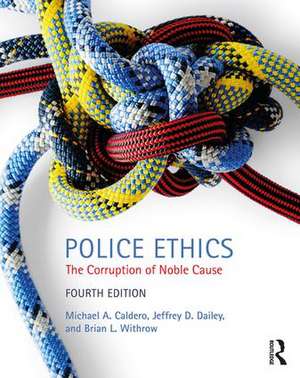Police Ethics: The Corruption of Noble Cause
Autor Michael Caldero, Jeffrey Dailey, Brian Withrowen Limba Engleză Paperback – 12 feb 2018
This timely new edition offers police administrators direction for developing agency-wide corruption prevention strategies, and a re-written chapter further expands our level of understanding of corruption by covering the Model of Circumstantial Corruptibility in detail. The fourth edition also discusses critical ethical issues relating to the relationship between police departments and minority communities, including Black Lives Matter and other activist groups. In the post-Ferguson environment, this is a crucial text for students, academicians, and law enforcement professionals alike.
| Toate formatele și edițiile | Preț | Express |
|---|---|---|
| Paperback (1) | 392.50 lei 3-5 săpt. | +28.10 lei 5-11 zile |
| Taylor & Francis – 12 feb 2018 | 392.50 lei 3-5 săpt. | +28.10 lei 5-11 zile |
| Hardback (1) | 1048.75 lei 6-8 săpt. | |
| Taylor & Francis – 12 feb 2018 | 1048.75 lei 6-8 săpt. |
Preț: 392.50 lei
Preț vechi: 426.63 lei
-8% Nou
Puncte Express: 589
Preț estimativ în valută:
75.11€ • 78.13$ • 62.01£
75.11€ • 78.13$ • 62.01£
Carte disponibilă
Livrare economică 24 martie-07 aprilie
Livrare express 08-14 martie pentru 38.09 lei
Preluare comenzi: 021 569.72.76
Specificații
ISBN-13: 9781138061170
ISBN-10: 1138061174
Pagini: 366
Ilustrații: 2 Line drawings, black and white; 2 Illustrations, black and white
Dimensiuni: 187 x 235 x 20 mm
Greutate: 0.66 kg
Ediția:4 New edition
Editura: Taylor & Francis
Colecția Routledge
Locul publicării:Oxford, United Kingdom
ISBN-10: 1138061174
Pagini: 366
Ilustrații: 2 Line drawings, black and white; 2 Illustrations, black and white
Dimensiuni: 187 x 235 x 20 mm
Greutate: 0.66 kg
Ediția:4 New edition
Editura: Taylor & Francis
Colecția Routledge
Locul publicării:Oxford, United Kingdom
Public țintă
UndergraduateCuprins
Part 1: Value-Based Decision-Making and the Ethics of Noble Cause
1. Value-Based Decision-Making: Understanding the Ethics of Noble Cause
2. Values, Hiring, and Early Organizational Experiences
3. Values and Administrative Dilemmas
4. The Social Psychology of Cops’ Values
Part 2: Noble-Cause Corruption
5. From Economic to Noble-Cause Corruption
6. Stress, Organizational Accountability, and the Noble Cause
7. Ethics and the Means-Ends Dilemma
8. Police Culture, Ends-Orientation, and Noble-Cause Corruption
Part 3: Ethics and Police in a Time of Change
9. Policing Citizens, Policing Communities: Toward an Ethic of Negotiated Order
10. The Stakes
11. Recommendations
12. Conclusion: The Noble Cause
1. Value-Based Decision-Making: Understanding the Ethics of Noble Cause
2. Values, Hiring, and Early Organizational Experiences
3. Values and Administrative Dilemmas
4. The Social Psychology of Cops’ Values
Part 2: Noble-Cause Corruption
5. From Economic to Noble-Cause Corruption
6. Stress, Organizational Accountability, and the Noble Cause
7. Ethics and the Means-Ends Dilemma
8. Police Culture, Ends-Orientation, and Noble-Cause Corruption
Part 3: Ethics and Police in a Time of Change
9. Policing Citizens, Policing Communities: Toward an Ethic of Negotiated Order
10. The Stakes
11. Recommendations
12. Conclusion: The Noble Cause
Notă biografică
Michael A. Caldero was a former Police Officer who presented seminars on the subject of police ethics to police commanders across the United States. He taught in the Department of Administration of Criminal Justice at Bellevue College.
Dr. Jeffrey D. Dailey is an Associate Professor of Border Security and Intelligence at Angelo State University. Prior to this he performed classified computer-aided military intelligence signal analysis (SIGINT) with active duty Army and Air Force intelligence units in several locations.
Dr. Brian L. Withrow is a Professor of Criminal Justice at Texas State University. Prior to joining the Texas State University faculty in 2009, Brian was an Associate Professor and Director of Forensic Sciences at Wichita State University.
Dr. Jeffrey D. Dailey is an Associate Professor of Border Security and Intelligence at Angelo State University. Prior to this he performed classified computer-aided military intelligence signal analysis (SIGINT) with active duty Army and Air Force intelligence units in several locations.
Dr. Brian L. Withrow is a Professor of Criminal Justice at Texas State University. Prior to joining the Texas State University faculty in 2009, Brian was an Associate Professor and Director of Forensic Sciences at Wichita State University.
Descriere
Police Ethics, Fourth Edition, provides an analysis of corruption in law enforcement organizations. The authors argue that the noble cause — a commitment to "doing something about bad people" — is a central "ends-based" police ethic that can paradoxically lead to community polarization and increased violence when officers violate the law on behalf of personally held moral values. This timely new edition discusses agency-wide corruption prevention strategies and ethical issues relating to the relationship between police departments and minority communities. In the post-Ferguson environment, this is a crucial text for students and law enforcement professionals alike.
